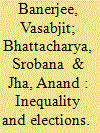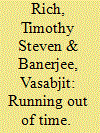|
|
|
Sort Order |
|
|
|
Items / Page
|
|
|
|
|
|
|
| Srl | Item |
| 1 |
ID:
173864


|
|
|
|
|
| Summary/Abstract |
Social capital research has measured the concept in two distinct ways: through direct reporting by participants in cross-national surveys and the presence of associative organisations. Both strategies raise difficulties: the former restricts comparability and assumes group stability; the latter relies on literal translation and uses direct questioning. We problematise these approaches and argue that the ratio of ‘check-points’ where individuals are asked to demonstrate adherence to rules, and ‘trust-points’ where such proofs are not required, can better measure social capital. Moreover, the unevenness of social capital between groups is perceptible by ‘fast-lanes’ that differentially treat individuals based on identity. Evidence from a field survey and observational evidence in South Africa is presented.
|
|
|
|
|
|
|
|
|
|
|
|
|
|
|
|
| 2 |
ID:
192850


|
|
|
|
|
| Summary/Abstract |
How does Russia’s invasion of Ukraine affect Taiwanese perceptions about their own defense? Despite frequent comparisons of the war in Ukraine with a potential invasion of Taiwan, existing analyses do not directly measure Taiwanese public perceptions of a linkage. Using survey data from the Taiwan Institute for Governance and Communication Research, we identify not only the extent of concern about the war but also how this corresponds to worries about a Chinese invasion, confidence in Taiwan’s ability to win such a war, and belief about US defensive commitments to Taiwan.
|
|
|
|
|
|
|
|
|
|
|
|
|
|
|
|
| 3 |
ID:
135786


|
|
|
|
|
| Summary/Abstract |
This paper addresses the effects of the mixed system used for the last three elections in Lesotho (2002, 2007 and 2012), a small African country with a turbulent history regarding opposition acceptance of elections. The decision to implement a mixed system was in part to encourage democratic stability, yet whether the electoral system has become more conducive to democratic competition is unclear. Through an analysis of national and district-level results, this paper addresses the following questions. First, at the district level, is competition consistent with Duverger’s law or the contamination thesis and is a progression over time evident? Second, does the population size of a district influence the number of candidates and the concentration of votes? Finally, following recent research on detecting electoral fraud, this paper tackles whether the reports of district results suggest extra-institutional manipulation.
|
|
|
|
|
|
|
|
|
|
|
|
|
|
|
|
| 4 |
ID:
135789


|
|
|
|
|
| Summary/Abstract |
This paper addresses the effects of the mixed system used for the last three elections in Lesotho (2002, 2007 and 2012), a small African country with a turbulent history regarding opposition acceptance of elections. The decision to implement a mixed system was in part to encourage democratic stability, yet whether the electoral system has become more conducive to democratic competition is unclear. Through an analysis of national and district-level results, this paper addresses the following questions. First, at the district level, is competition consistent with Duverger’s law or the contamination thesis and is a progression over time evident? Second, does the population size of a district influence the number of candidates and the concentration of votes? Finally, following recent research on detecting electoral fraud, this paper tackles whether the reports of district results suggest extra-institutional manipulation
|
|
|
|
|
|
|
|
|
|
|
|
|
|
|
|
| 5 |
ID:
073727


|
|
|
| 6 |
ID:
074288


|
|
|
| 7 |
ID:
073408


|
|
|
| 8 |
ID:
157480


|
|
|
|
|
| Summary/Abstract |
This article investigates the causes of India's Maoist insurgency and its changing dynamics. To explain its origins, we empirically test three hypotheses using cross-state-level data: inequality of wealth in states; inefficient state government; and, disgruntled provocateurs. Our analysis reveals that insurgency is caused by inequality of wealth in states, not inefficient state governments and disgruntled provocateurs. Subsequently, we study variations in the number of Maoist attacks and the selected targets in the eastern Indian state of West Bengal using newspaper reports of events. Our analysis demonstrates that the numbers of incidents and the type of targets selected depend on electoral competition between regional political parties and their interactions with Maoists. The findings, therefore, indicate that whereas inequality of wealth can explain the insurgency's presence in states, political competition within states could explain its dynamics.
|
|
|
|
|
|
|
|
|
|
|
|
|
|
|
|
| 9 |
ID:
153647


|
|
|
|
|
| Summary/Abstract |
Political unrest in 2014 threatened Lesotho’s newly found democratic stability. Observers focus on educating the public about the electoral system and encouraging pre-election coalition discussions. However, this analysis suggests that such remedies ignore the institutional influences of Lesotho’s electoral system that undermine both public understanding and stability. Furthermore, a statistical analysis of district competition finds the 2015 elections to be largely consistent with previous elections, but that the percentage of rejected ballots correlates with a district victory for the largest party. Although this may simply be a statistical anomaly, the findings highlight structural challenges and reconsideration of electoral reforms.
|
|
|
|
|
|
|
|
|
|
|
|
|
|
|
|
| 10 |
ID:
139478


|
|
|
|
|
| Summary/Abstract |
The Indo-Pakistani rivalry is among the most hostile in the world today. This paper provides a new explanation for why we observe variation in hostility leves in this rivalry.
|
|
|
|
|
|
|
|
|
|
|
|
|
|
|
|
| 11 |
ID:
137199


|
|
|
|
|
| Summary/Abstract |
This article highlights the precarious nature of Taiwan’s diplomatic relations in Africa. Whereas Cold War rationales initially benefitted Taiwan, economic interests now appear to incentivize African countries to establish relations with China. Through qualitative and quantitative data covering much of the post-World War II era, this analysis argues that economic factors have trumped political ration-ales for Taiwanese–African relations. In addition, this article prob-lematizes both conceptions of diplomatic recognition and Taiwan’s enduring relations with Africa.
|
|
|
|
|
|
|
|
|
|
|
|
|
|
|
|
|
|
|
|
|